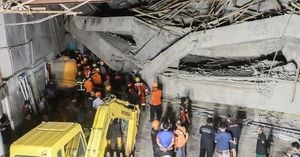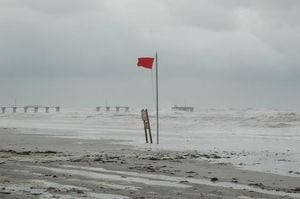For more than a week, the valleys of Pakistan-occupied Kashmir (PoK)—usually celebrated for their scenic beauty—have been gripped by violence and tragedy. What began as peaceful protests over basic necessities like affordable electricity and subsidized flour has escalated into a bloody confrontation, leaving at least 10 civilians dead and more than 100 injured, according to reports cited by the Times of Israel and International Business Times. The world, however, has responded with what some experts are calling a "deafening" silence.
The unrest is centered in the towns of Muzaffarabad, Dheerkot, Rawalakot, and Mirpur, where demonstrators led by the Jammu Kashmir Joint Awami Action Committee (JAAC) have taken to the streets. Their demands? Nothing more radical, as described by human rights expert Michael Arizanti, than "affordable electricity, subsidised flour, and dignity." Yet, these calls for basic rights have been met with bullets, curfews, and a communications blackout, cutting off more than 4.5 million residents from the outside world.
According to Arizanti, who has written extensively on West Asia affairs, the scale of the crackdown has been severe. Security forces, including paramilitary troops from mainland Pakistan—outsiders in every sense, he notes—were deployed to suppress the protests. "At least 10 people were killed and over 100 injured in Muzaffarabad, Dheerkot, Rawalakot, and Mirpur," Arizanti wrote in his blog for the Times of Israel. The victims, many of them young men, were shot dead or injured by live ammunition, tear gas, and batons wielded by Pakistani forces.
What makes the situation even more troubling, Arizanti argues, is the economic injustice fueling the protests. The PoK region generates nearly a third of Pakistan's hydroelectricity, yet its residents pay some of the highest electricity tariffs in the country—Rs 40-50 per unit, compared to production costs of just Rs 4-7. Meanwhile, the elites in Islamabad and so-called "Azad Kashmir" reportedly enjoy free power, fuel, and unchecked privileges. Pakistan, Arizanti claims, owes the region at least Rs 370 billion in royalties, but instead of repayment, it sends Rangers and federal police to enforce order.
This is not the first time such unrest has erupted. Previous cycles of protest in 2023 and 2024, sparked by similar grievances over flour shortages and electricity prices, were also met with state firepower, leaving multiple civilians dead. The pattern, as described in the International Business Times, is clear: "demands for rights in PoK are answered with repression."
Yet, despite the mounting toll, the international community has remained largely silent. Arizanti is blunt in his criticism, accusing both Western nations and Islamic countries of "shameful hypocrisy." He points out that when violence erupts in places like Gaza or Ukraine, the world’s attention is swift and overwhelming—emergency UN sessions are called, hashtags trend globally, and politicians rush to express indignation. But when it comes to the deaths of Kashmiri Muslims in PoK, he says, "the massacre of Muslim civilians in PoK has barely stirred a whisper. The selective outrage is deafening."
The Organisation of Islamic Cooperation (OIC), which is often quick to issue statements against India whenever incidents occur in Jammu and Kashmir, has not uttered a single word about the killings in PoK. "Not one," Arizanti emphasizes. "Where are the imams, the scholars, the ministers who thunder about Gaza every Friday? The hypocrisy is as transparent as it is shameful." Western powers, too, have been called out for their silence, despite being vocal on crises in Ukraine, Gaza, and Myanmar.
Arizanti’s frustration is palpable as he draws a stark comparison: "Why is the death of a Palestinian in Gaza a global headline, but the death of a Kashmiri Muslim in Muzaffarabad is a footnote, if acknowledged at all? Both are victims, both cry out for dignity, and yet the international community decides whose suffering matters." He calls the killings in PoK a "crime against humanity" and urges the United Nations and European Union to take immediate action.
The demands of the protesters are, at their core, about survival and dignity. "The people of PoK are demanding electricity they can afford, wheat they can eat, representation they can trust. They are not asking for secession, but for dignity. Yet the Pakistani state answers them with violence," Arizanti writes. He insists that "Kashmiris in PoK deserve the same rights and protections the world demands for Ukrainians or Palestinians. Their blood is not cheaper. Their cries are not quieter. They are simply unheard."
On the ground, the atmosphere remains tense. Curfews and communication blackouts have left millions isolated, unable to reach loved ones or share their stories with the outside world. The deployment of paramilitary forces from outside the region has only heightened feelings of alienation and resentment among locals, who see themselves as exploited for the benefit of others. The region’s hydroelectric resources, which should be a source of prosperity, have instead become a symbol of their marginalization.
Economically, the injustice is glaring. Residents of PoK pay electricity tariffs that are ten times the cost of generation, a burden that is especially hard to bear given the region’s poverty and its role as a key energy supplier for the rest of Pakistan. The government’s failure to pay royalties—estimated at Rs 370 billion—only adds to the sense of betrayal. Instead of addressing these longstanding grievances, the state’s response has been to send in security forces, deepen the curfew, and cut off communications.
For many observers, the silence from the international community is as troubling as the violence itself. There have been no emergency sessions at the UN, no resolutions from the European Parliament, and no statements from the Arab League. The OIC, so vocal on other issues, has remained conspicuously quiet. This, Arizanti argues, is evidence of a double standard that undermines the credibility of international human rights advocacy.
As the protests continue and the world looks the other way, the people of PoK remain trapped between a government that responds to peaceful demands with force and an international community that seems unwilling to listen. Their struggle is not for secession or revolution, but for fairness, representation, and the basic dignity that comes with having one’s voice heard and needs met.
In the end, the crisis in PoK raises uncomfortable questions about whose suffering the world chooses to acknowledge—and whose it ignores. For now, as Arizanti and others have warned, the valleys remain drenched in both blood and silence.




